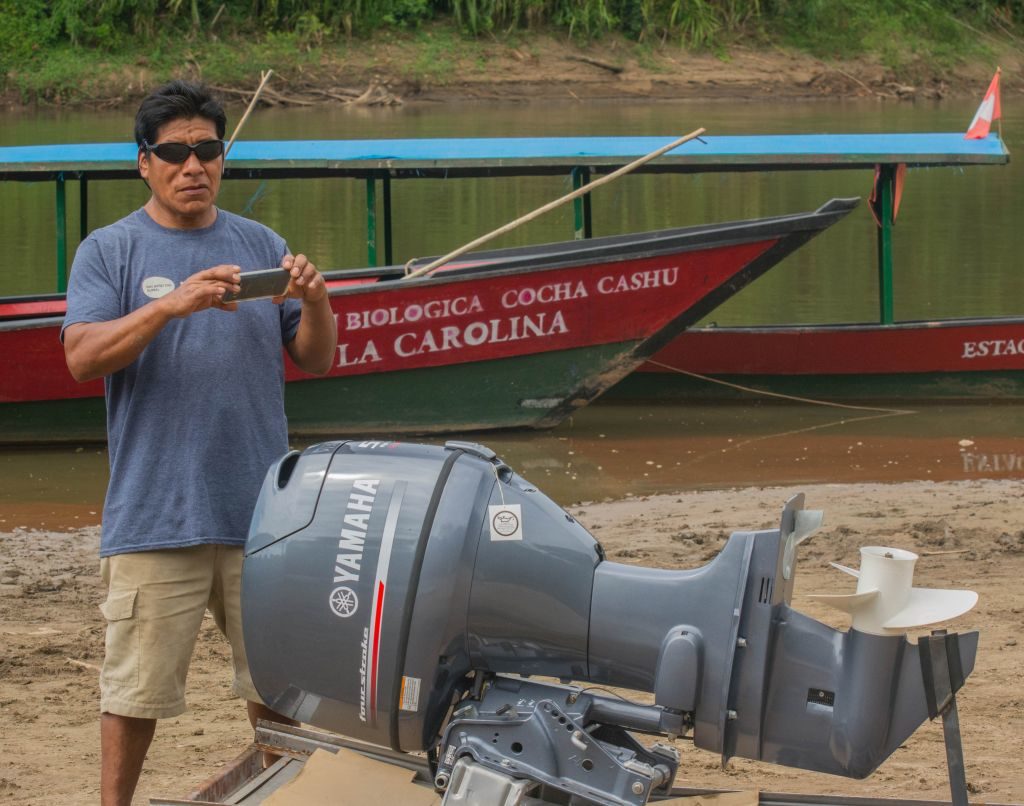Please note: If you would like to contact a member of our staff and clicking on that person’s name doesn’t work, please right-click on it instead, select “Copy email address” and simply paste it into the recipient bar of an email.
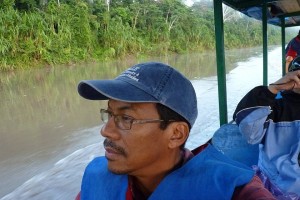 Cesar Flores is Director of the Cocha Cashu Biological Station and of San Diego Zoo Global Peru. He initiated his research career in Cocha Cashu in 1986, exploring the phenology of squirrel monkey fruit diets. Since then he has remained connected to the Park and the station, carrying out research in plant ecology, and assisting with Park guard training programs. Cesar is a Peruvian, certified forestry engineer, graduated from the la Molina National Agrarian University (1988), holding a Master of Forest Science from the Yale School of Forestry and Environmental studies (1995), and currently working on his Ph.D. dissertation on the regeneration ecology of tropical lowland cedars. His interests range from plant establishment and eco-physiology, insect –plant interactions, and tropical soils, to forest management for ecosystem services (eco-hydrology being his most recent undertaking).
Cesar Flores is Director of the Cocha Cashu Biological Station and of San Diego Zoo Global Peru. He initiated his research career in Cocha Cashu in 1986, exploring the phenology of squirrel monkey fruit diets. Since then he has remained connected to the Park and the station, carrying out research in plant ecology, and assisting with Park guard training programs. Cesar is a Peruvian, certified forestry engineer, graduated from the la Molina National Agrarian University (1988), holding a Master of Forest Science from the Yale School of Forestry and Environmental studies (1995), and currently working on his Ph.D. dissertation on the regeneration ecology of tropical lowland cedars. His interests range from plant establishment and eco-physiology, insect –plant interactions, and tropical soils, to forest management for ecosystem services (eco-hydrology being his most recent undertaking).
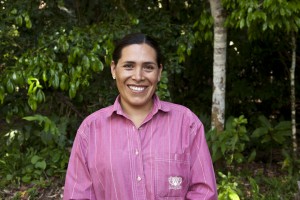 Peruvian economist Verónica Chávez has a broad experience in administrative and logistical management of the Cocha Cashu Biological Station, for which she has worked for the last 17 years. She is responsible for the preparation of budgets, coordination of visitor schedules and travel logistics, purchasing of general supplies and fuel, and meeting the many requirements of Cocha Cashu’s researchers and staff. She also facilitates the vital process of obtaining research permits, working closely with the Peruvian Park Service (SERNANP). She loves nature and feels personally committed to the research and conservation of biodiversity.
Peruvian economist Verónica Chávez has a broad experience in administrative and logistical management of the Cocha Cashu Biological Station, for which she has worked for the last 17 years. She is responsible for the preparation of budgets, coordination of visitor schedules and travel logistics, purchasing of general supplies and fuel, and meeting the many requirements of Cocha Cashu’s researchers and staff. She also facilitates the vital process of obtaining research permits, working closely with the Peruvian Park Service (SERNANP). She loves nature and feels personally committed to the research and conservation of biodiversity.
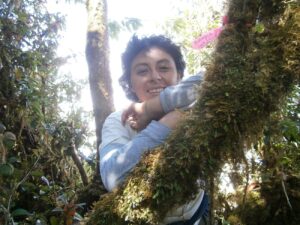 Yeissy Sarmiento trained as a biologist at the San Luis Gonzaga National University and completed her master’s studies in Environmental Education at the Federal University of Rio Grande, Brazil. Her professional experience includes work in conservation, either as a volunteer or as a field assistant.
Yeissy Sarmiento trained as a biologist at the San Luis Gonzaga National University and completed her master’s studies in Environmental Education at the Federal University of Rio Grande, Brazil. Her professional experience includes work in conservation, either as a volunteer or as a field assistant.
She worked as coordinator of the Environmental Education program of the NGO Neotropical Primate Conservation, in schools of rural communities that practice community conservation, in the Amazon and San Martín regions of Peru. She also collaborated with the Regional Environmental Authorities (ARA) and national authorities (SERFOR) on the care and relocation of wild animals rescued from wildlife traffickers, and has coordinated prevention campaigns on this issue in local media and educational centers in the cities of Tarapoto, Pucallpa and Iquitos.
Her interest in becoming an environmental educator stems from a diversity of experiences and reflections, with the expectation that education in any of its forms can be a way of transformation for society. She believes the environmental educator is the translator and communicator of scientific knowledge about nature in simpler languages.
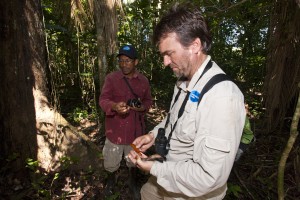
Dr. Ron Swaisgood serves San Diego Zoo Global as the Brown Endowed Director of Applied Animal Ecology. He also heads the Giant Panda Conservation Unit and is the General Scientific Director of Cocha Cashu Biological Station in Manu National Park in the Peruvian Amazon. Ron earned a bachelor’s degree from the University of North Carolina at Chapel Hill and a Ph.D. in Animal Behavior from the University of California, Davis. Trained as a field biologist, Ron supervises a number of conservation science programs, primarily in California, Mexico, China, South Africa and Peru. These include (1) ecological and behavioral research programs for several bear and other mammalian species (2) population monitoring and adaptive management programs for local bird, reptile and amphibian species; and (3) translocation/reintroduction programs for several species such as kangaroo rats, owls, rhinoceros, condors, tortoises, and frogs. Some of these programs have endured for over a decade. In this capacity, he supervises field teams on three continents and has developed and implemented a number of international collaborations.
Most of Ron’s research experience focuses on using ecological and behavioral theory to address critical conservation questions, using science as a tool for improved conservation management, and with most projects involving single species conservation in a broader ecosystem context. Habitat evaluation and in some cases restoration is a critical part of these programs. The latest technologies, ranging from GPS satellite collars to remote video surveillance, combined with the extensive laboratory resources available at ICR, are employed to answer key ecological questions with conservation implications.
The Zoo’s giant panda program, headed by Ron, has been one of the ICR’s largest, most collaborative international programs, involving multiple partnerships with universities, zoos, and governments. The California condor is another example, where long-term efforts, including establishment of a field station in partnership with several Mexican agencies, have contributed to the recovery of a critically endangered species throughout much of its former range.
More recently, Dr. Swaisgood has increasingly focused the division’s conservation science efforts in Peru. In addition to Cocha Cashu, he supervises a large-scale program on Andean bear ecology and conservation, in collaboration with Spectacled Bear Conservation; and an Amazonian population ecology program, in collaboration with WWF, designed to use large mammals as indicators of ecosystem function and to facilitate conservation planning and management.
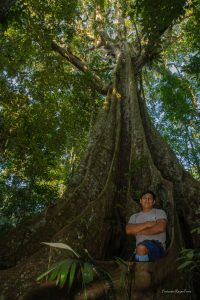 Fortunato Rayan Perez works at Cocha Cashu since 2009. In the early years he worked as a boatdriver, participating in various projects. In the course of his work he realized he was in a paradise of flora and fauna, and this aroused his passion for photography, because photography is a very important instrument to convey the natural world to the general public. He believes that photography is a tool that is complemented by the work done by scientists, and hopes his images do their bit to contribute to the protection of nature. Since 2016, Fortunato holds the position of Administrative Assistant at the Cocha Cashu Biological Station.
Fortunato Rayan Perez works at Cocha Cashu since 2009. In the early years he worked as a boatdriver, participating in various projects. In the course of his work he realized he was in a paradise of flora and fauna, and this aroused his passion for photography, because photography is a very important instrument to convey the natural world to the general public. He believes that photography is a tool that is complemented by the work done by scientists, and hopes his images do their bit to contribute to the protection of nature. Since 2016, Fortunato holds the position of Administrative Assistant at the Cocha Cashu Biological Station.
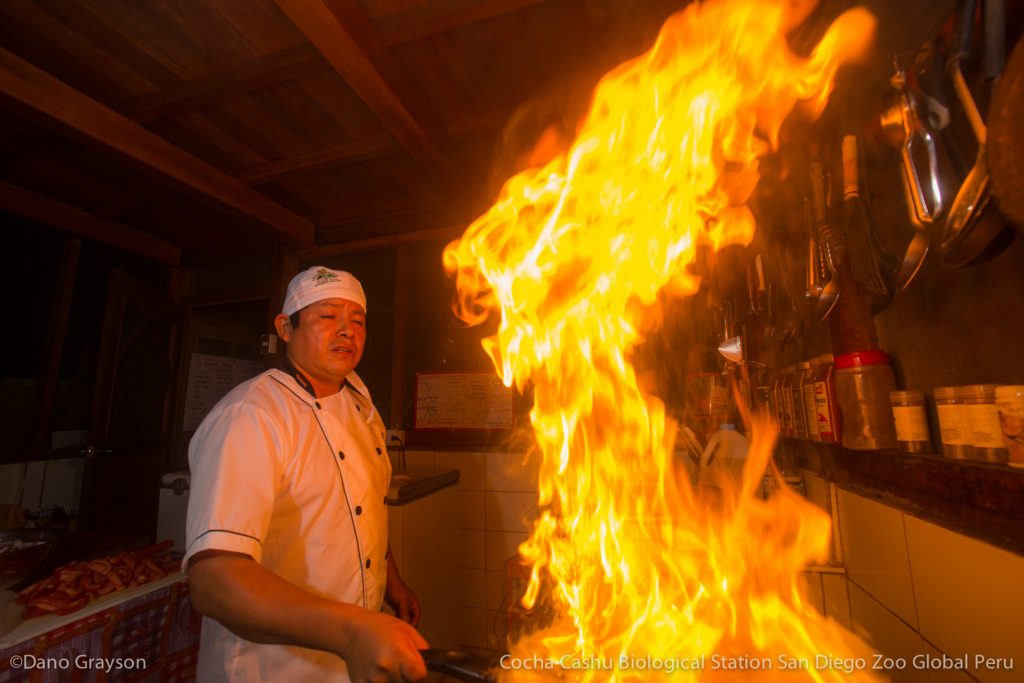 Eloy Ochoa is a professional rainforest adventure chef, with experience in Manu National Park since 1997. He has worked for several years at Cocha Cashu, preparing healthy, balanced, and nutritious food for our researchers, course students, and Station staff. He is part of research and conservation efforts, and also loves and protects nature.
Eloy Ochoa is a professional rainforest adventure chef, with experience in Manu National Park since 1997. He has worked for several years at Cocha Cashu, preparing healthy, balanced, and nutritious food for our researchers, course students, and Station staff. He is part of research and conservation efforts, and also loves and protects nature.
Mario Cruz Huamán was born in Cusco in 1967. He currently works at the Cocha Cashu Biological Station as boatdriver and on everything to do with motor maintenance. He arrived in Madre de Dios in 1978, started his work in Puerto Mazuco, Rio Inambari, and arrived in Boca Manu in 1984 working as a boatdriver for the merchants on the Shintuya-Colorado-Labyrinth route. Mario began work in tourism in 1995 in Puerto Maldonado with the Macaw Project for the company Tapir Tours. He returned to Boca Manu in 1996 working for the company Manu Nature Tours until 1999. He has also worked in the companies Manu Ecológico, Inca Natura, and Crees, and has participated in several courses and workshops in mechanics.
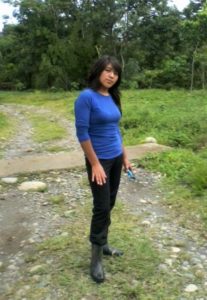 In the words of Maryori Condori: “I studied at the ISTP KHIPU, the Accounting degree. I have experience in administrative management, accounting, and treasury. I worked at ACCA for 5 years as Accounting and Treasury Assistant and now I work for San Diego Zoo Global Peru, again supporting in accounting and administration for a good cause. I love nature, animals, and protecting nature!”
In the words of Maryori Condori: “I studied at the ISTP KHIPU, the Accounting degree. I have experience in administrative management, accounting, and treasury. I worked at ACCA for 5 years as Accounting and Treasury Assistant and now I work for San Diego Zoo Global Peru, again supporting in accounting and administration for a good cause. I love nature, animals, and protecting nature!”

